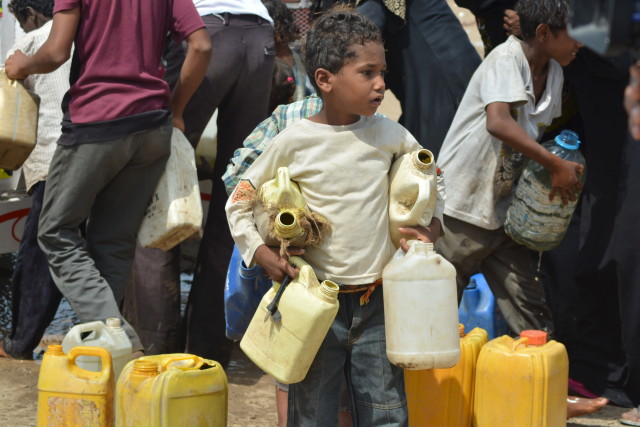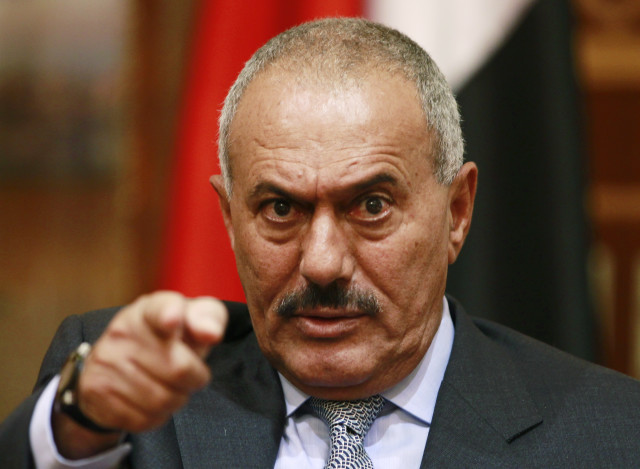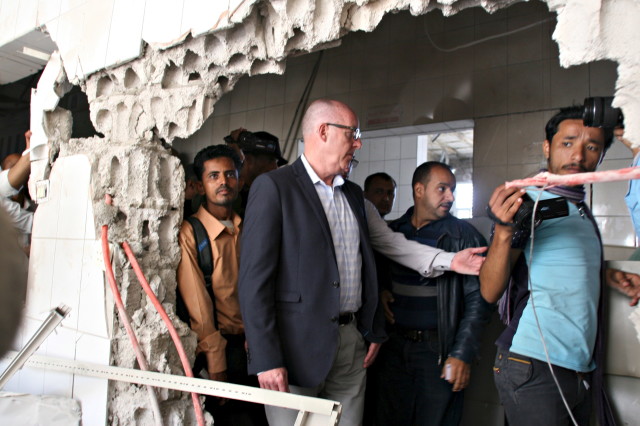By Barbara Slavin
With global attention focused on the humanitarian crisis in Syria, an increasingly dire situation in Yemen is not receiving sufficient notice.
Some 21 million of the country’s 26 million people need outside aid, according to Andrew Pitt, director of North African and Arabian Affairs at the U.S Agency for International Development (USAID). By March – the one-year anniversary of the Saudi bombing of Yemen – he said most of the country is projected to be in a full-fledged food crisis.

A boy carries jerry cans to fill from a water tanker truck in in Yemen’s Red Sea city of Houdieda on Feb.15, 2016. (Reuters)
This “critical emergency has flown under the radar,” Pitt told an audience at the Middle East Institute in Washington last week. A country that already was one of the most food insecure is now “on the fringes of famine,” he said.
The conflict in Yemen is complex and compounded by foreign intervention – much like the Syrian war.
A political deal reached in 2011 after a popular uprising against long-time leader Ali Abdullah Saleh unraveled three years later when Saleh joined the Houthis. Although they had previously been adversaries, the Houthis and Saleh joined to challenge the government of President Abd Rabbu Mansur Hadi, Saleh’s former vice president. The Houthis seized the capital, Sanaa, in September 2014. About four months later, Hadi’s government resigned and fled the city.
Not content with controlling Sanaa, the Houthis and Saleh’s forces swept south and took control of territory with which the Houthis, a northern faction, had less affinity. The Saudis intervened in support of Hadi and a loose coalition of southern factions, tribes and Sunni Islamist groups.

Yemen’s President Ali Abdullah Saleh points during an interview with selected media, including Reuters, in Sanaa in 2011. (Reuters)
After months of bombing, the Saudi-backed force took the southern port city of Aden and installed the Hadi government there last summer. The cost has been extremely high – 6,000 dead, nearly half of them civilians, killed in Saudi airstrikes.
Aden is not yet completely pacified, and bombs go off there with frightening regularity. Much of the rest of the country remains contested and groups such as al-Qaida and the Islamic State have benefited from the instability to expand their hold on strategic territory, including Hadramawt, Yemen’s largest province.
The Houthis have responded to the Saudi-led offensive by shooting Scud missiles across the border into Saudi Arabia. While the Saudis have intercepted the missiles with Patriot batteries, the attacks have hardened Saudi resolve to squash the Houthis, who follow the Zaidi branch of Shi’ite Islam.
Gen. Ahmed al-Asiri, an adviser to Prince Mohamed bin Salman, the Saudi defense minister and son of King Salman, claimed Feb. 8 in a Skype conversation with a Washington think tank, the Center for a New American Security, that 80 percent of Yemen is now under Hadi’s control and that the recapture of Sanaa is imminent.
But a recent report by the International Crisis Group said the conflict has been “a bloody stalemate” since September.
The Houthis and Saleh “are slowly losing territory,” according to Charles Schmitz, an expert on Yemen at the Middle East Institute. He predicted “a long slow grind in which everyone suffers” and there is “no clear victory on either side, just destruction.”
Amat Alsoswa, a former Yemeni cabinet minister, told the Middle East Institute gathering that economic activity in Yemen has ground to a halt, including production of oil and gas, which provides 70 percent of government revenues. Saudi bombing has destroyed hospitals, schools and other infrastructure. Nearly half the population has no access to clean water and adequate sanitation, she said, adding that more than 2.5 million people have been displaced.
Unlike Syria, however, Yemen has not generated a massive refugee exodus because, Alsoswa said, Yemenis “can’t go anywhere” and are denied visas by neighboring states. A few thousand have escaped to Djibouti, and a handful to Somalia, itself a fragile state.
Efforts by a U.N. mediator, Walid Sheikh, to end the fighting have failed although he did manage to engineer a prisoner swap in December. A round of peace talks scheduled for January was indefinitely postponed.
Experts suggest broadening talks beyond the Hadi government and the Houthis to include other influential factions such as Islah, the Yemeni affiliate of the Muslim Brotherhood, as well as representatives from Saudi Arabia and Iran, which has backed the Houthis rhetorically and provided a minor amount of material support. But the growing rift between Saudi Arabia and Iran, exacerbated by the crisis in Syria, has made a settlement in Yemen even more elusive.
Given the difficulty of devising a new political compact for a historically divided country, the International Crisis Group said the priority should be temporary agreements to allow for delivery of humanitarian aid, particularly for the city of Taiz.

Resident Coordinator of the United Nations in Yemen, Jamie McGoldrick (C), inspects damage at a hospital in Yemen’s city of Taiz on Jan. 21, 2016. (Reuters)
On Saturday, the Red Cross managed to deliver urgently needed supplies to Taiz for the first time since August. But U.N. officials described the relief as a “one-off” that would only feed 3,000 families for a month.
Longer term, negotiations should address long-standing demands by southern Yemenis for more autonomy, the ICG said.
It would also be helpful if divisive figures such as Saleh, who ruled Yemen from 1978 until 2011, and Hadi, who has scant following even in his own region, left the scene, the ICG said. Hadi’s Vice President Khaled Bahah is seen by many as a plausible compromise candidate.
Les Campbell, director of Middle East and North Africa programs for the National Democratic Institute, told the Washington audience that Bahah is a very capable technocrat but “not the only one…Yemen is not a basket case,” Campbell said.
“There are tons of able people, one of them at this table,” he said, pointing to Alsoswa, who could govern Yemen if given the chance.
Barbara Slavin is Acting Director of the Future of Iran Initiative at the Atlantic Council in Washington.

